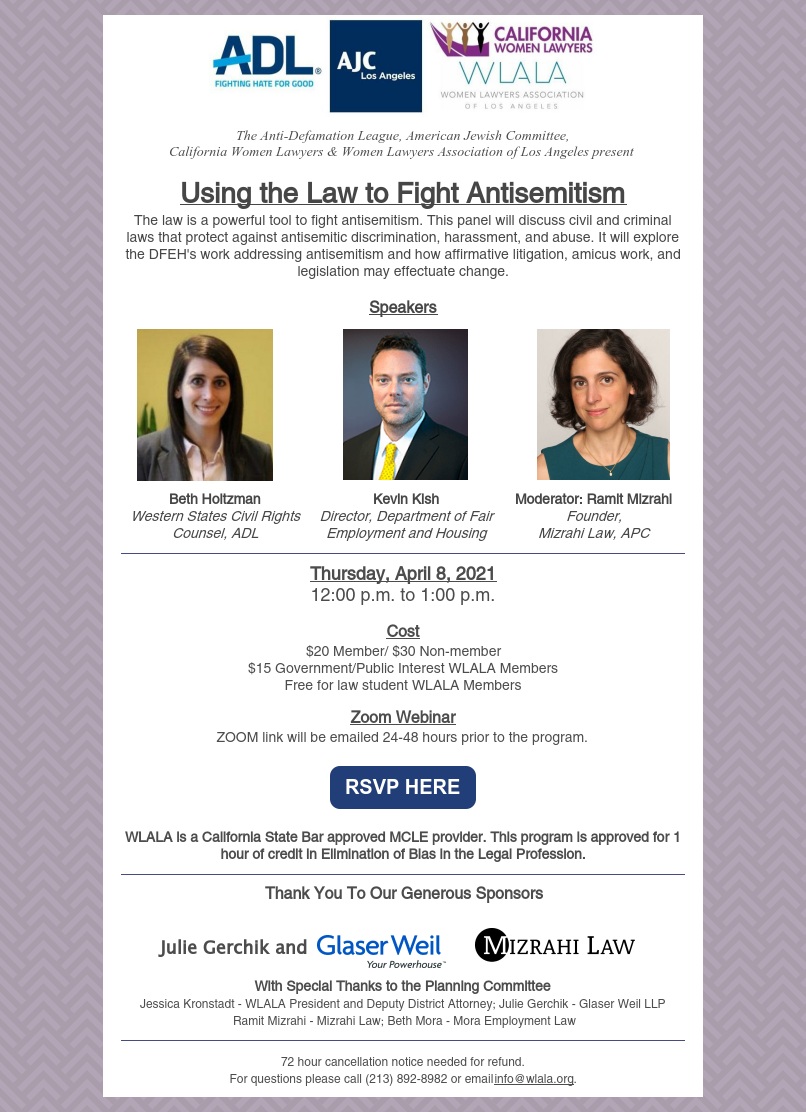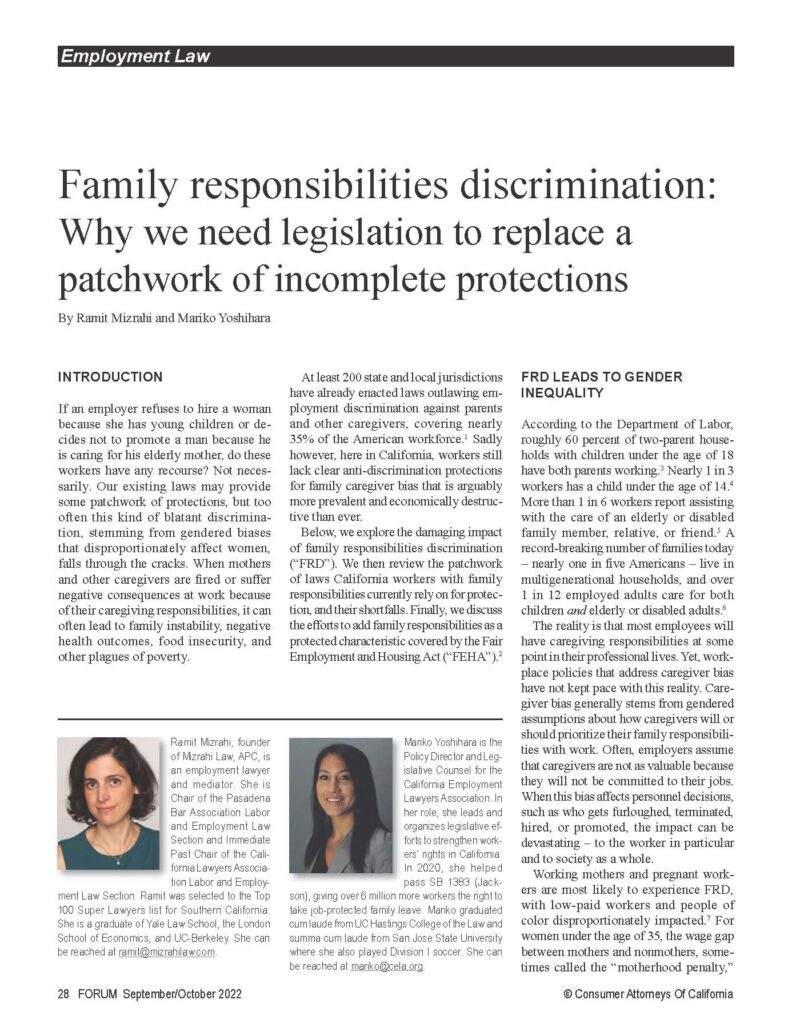-
In its September/October 2022 issue, CAOC Forum published an article by Ramit Mizrahi and Mariko Yoshihara on family responsibilities discrimination.
The article explores the damaging impact of family responsibilities discrimination. It then reviews the patchwork of laws California workers with family responsibilities currently rely on for protection, and their shortfalls. Finally, the articles discusses the efforts to add family responsibilities as a protected characteristic covered by the Fair Employment and Housing Act (“FEHA”).
Click below to read the article in full.
-

Introduction — California Protections for Pregnant Workers
California law offers strong protections to employees who have been subjected to discrimination and harassment. Despite that, pregnancy discrimination and retaliation for standing up to discrimination remain rampant. Once employees have been wrongfully terminated, they often know to reach out to seek legal help immediately. But current employees are often more confused about what to do. They may rightfully feel afraid about reporting unlawful conduct to Human Resources, particularly when the conduct is coming from their immediate supervisor. What if it just makes the situation worse? Indeed, far too often, Human Resources is more concerned with protecting the company than with taking the immediate corrective action that the law requires of them. A retaliating supervisor can make a job feel like death by 1,000 paper cuts: scrutinizing, criticizing, and nit-picking every action by an employee, making them feel ostracized or humiliating them in front of their peers, and leaving them in a constant state of fear and anxiety. Indeed, if true, the experiences of the Google employee whose memo went viral demonstrate the myriad ways that a company can fail its employees and allow discrimination and retaliation to persist.
An employee’s best hope is to be fully informed about their legal rights. They can then decide whether to report internally, to file a claim with one of the government agencies that investigates and enforces anti-discrimination laws, to seek private counsel to negotiate an exit or to file suit, or to make a conscious decision to wait (being mindful that if a person waits too long, they may forever lose their ability to assert the claim–a post on this topic will be forthcoming). To that end, I provide the following brief overview of employment protections for California workers subjected to pregnancy discrimination and retaliation. Note that many of these topics have been covered in greater depth elsewhere throughout the blog. (The archive categories are listed to the right of this post.)
1. Discrimination
The Fair Employment and Housing Act (“FEHA”) prohibits discrimination against employees because they belong to a protected category (sex, pregnancy, race, religion, disability, etc.). This includes refusing to hire or promote employees, terminating them, or discriminating against them in compensation or in terms, conditions, or privileges of employment.
2. Harassment
The FEHA further prohibits harassment against employees, applicants, unpaid interns or volunteers, and contractors because of their protected status. Employers are strictly liable for harassment by a supervisor. They are liable for harassment by non-supervisors, and even non-employees, if they knew or should have known of the conduct but failed to take immediate and appropriate corrective action. Employers are obligated to take all reasonable steps to prevent harassment from occurring. An employee need not lose tangible job benefits (e.g., be terminated or demoted) to establish harassment. More on workplace harassment can be found here.
3. Retaliation
The FEHA protects an employee who has “opposed any practices forbidden” under the Act.
An employee is engaging in protected activity when she opposes any practice that would violate the FEHA, even if the practice is not directed at her: “The ‘opposition’ clause protects conduct by an employee who is not the direct victim of a practice made unlawful under Title VII, but who ‘opposes’ such discrimination against others.” (Chin, et al., Cal. Practice Guide Employment Litigation (2019 The Rutter Group) ¶ 5:1527.) Thus, it is unlawful for an employer to retaliate against an employee who reports or otherwise opposes pregnancy discrimination. The FEHA separately imposes liability on an employer for failing to prevent retaliation.
An employee does not have to be right that discrimination actually occurred; they are protected if they had a good-faith belief of discrimination.
Employees also have protections under California’s general whistleblower protection statute, Labor Code § 1102.5, which protects employees from retaliation when they (1) disclose information that they reasonably believe to violate state, federal, or local laws or regulations, or (2) refused to participate in any activity that would violate state, federal, or local laws or regulations.This protection applies whether the employee complains (a) externally to a government or law enforcement agency or to a public body conducting an investigation, inquiry or hearing, or (b) internally to “a person with authority over the employee or another employee who has the authority to investigate, discover, or correct the violation or noncompliance” (e.g., their manager or HR).
Employees are protected even if the disclosures were part of their job duties (so for example, a safety officer is still protected when speaking out about unsafe conditions). Family members of a person who has, or was perceived to have, engaged in protected activities are also protected from retaliation.
Despite these protections, research has shown that when discrimination or harassment is reported, the consequences can be dire: an estimated 75% of employees who speak out against workplace mistreatment faced some form of retaliation.
-
28 Jul '21

On July 28, 2021, the New York Times investigated the practice by employers of encouraging employees who report workplace discrimination or harassment to use employer-sponsored mental health treatment. The article is titled “‘You’re the Problem’: When They Spoke Up About Misconduct, They Were Offered Mental Health Services.” Ramit Mizrahi was interviewed by the article’s authors, Alisha Haridasani Gupta and Ruchika Tulshyan, and is quoted several times in the article.On the surface, the practice of offering employees employer-sponsored mental health sessions might seem to be helpful to employees. But it can sometimes cause more harm than good.
First, employers have an obligation to take all reasonable steps necessary to prevent unlawful workplace discrimination and harassment. This means that when an employer receives a complaint of discrimination or harassment, it should conduct a prompt and thorough investigation and take corrective action as necessary. If an employer pushes an employee to take leave or seek therapy instead of investigating and taking corrective action, then it may not be fulfilling its legal obligations.
Second, when employees sue their employer for workplace discrimination or harassment and they allege emotional harm, some or all of their mental health records from that time period may become discoverable in litigation. Mental health records often reference sensitive information in a person’s life (for example, references to past abuse, family history information, third-party information, sexual history, addiction issues, etc.). If the employer is encouraging employees who complain about discrimination or harassment to seek mental health treatment so that it can later access those records and discover that information in the event of litigation, this can be potentially harmful to employees.
“If a potential client called me and said: ‘I’m being harassed at work, I feel really stressed and anxious. Do you think I should use my company’s E.A.P.?’” Ms. Mizrahi said, “I would advise them against it.”
-
08 Apr '21
Mizrahi Law is proud to sponsor the Women Lawyers Association of Los Angeles panel on Using the Law to Fight Antisemitism.
The panel features Department of Fair Employment and Housing Director Kevin Kish and ADL’s Western States Civil Rights Counsel Beth Holtzman, and is moderated by Ramit Mizrahi. The recording remains available for purchase.

-

Today is a day for the history books, and a day for celebration! In Bostock v. Clayton County, a landmark decision released on June 15, 2020, the United States Supreme Court held that Title VII of the Civil Rights Act of 1964’s prohibition on sex discrimination encompasses discrimination based on sexual orientation and gender identity. In doing so, the Court gave gay and transgender employees throughout the nation workplace protections from discrimination, harassment, and retaliation. The 6-3 opinion, authored by Justice Gorsuch, held that an employer who fires a worker for being gay or transgender violates Title VII, as doing so necessarily discriminates against that person because of sex. In doing so, the Court resolved a split among federal courts as to whether Title VII offered these protections—as some courts had held that employees could be fired for being gay or transgender.
Here in California, our civil rights law, the Fair Employment and Housing Act (“FEHA”), has protected gay and transgender employees from discrimination, harassment, and retaliation for years:
- In 2000, the FEHA was amended to prohibit discrimination based on sexual orientation.
- In 2003, the FEHA was amended to include “gender” in its definition of sex. The definition incorporated by reference then-Penal Code section 422.76, which defined gender as “the victim’s actual sex or the defendant’s perception of the victim’s sex, and includes the defendant’s perception of the victim’s identity, appearance, or behavior, whether or not that identity, appearance or behavior is different from that traditionally associated with the victim’s sex at birth.”
- In 2011, the FEHA was amended to specifically prohibit discrimination and harassment based on “gender,” “gender identity,” and “gender expression.”
I have traced this history and written before about why workplace protections are so important for gay and transgender employees. Now, workers throughout the nation will be protected.
Two of the three plaintiffs in these cases, Aimee Stephens and Donald Zarda, did not live to see this day—a poignant reminder that while we may not see the benefits of some of our work, we do it as much for future generations as for ourselves.
-

Over the past two years, we have followed the many bills that the California legislature has passed with the momentum of the #MeToo and #TimesUp movements. From last year’s omnibus sexual harassment bill (SB 1300), to the prohibition of confidentiality provisions in settlement agreements involving sexual harassment claims (SB 820), to the increase in time that employees would have to file claims under the Fair Employment and Housing Act (AB 9), these bills have been designed to increase protections for California workers.
Assembly Bill 749 (“AB 749”), introduced by Assemblymembers Mark Stone, Lorena Gonzalez, and Eloise Reyes, is another #MeToo-inspired bill meant to protect employees. It tackles “no rehire” provisions that are frequently found in settlement agreements. Employees who settle their claims against their employers are often required to agree that they will never again work for the same employer or its related entities. Such provisions are punitive and can have a devastating impact on an employee, forcing some to leave their field or severely limiting their future employment prospects. The use of “no rehire” provisions often leads to the perverse outcome where victimized employees are forced out of their jobs while harassers continue to be employed.[1]
AB 749, signed into law by Governor Newsom on October 12, 2019, prohibits and invalidates all provisions in settlement agreements that prevent workers from obtaining future employment with the settling employer or its affiliated companies. Through newly created Code of Civil Procedure section 1002.5, it makes such provisions in agreements entered into on or after January 1, 2020 void as a matter of law and against public policy. The bill is co-sponsored by the California Employment Lawyers Association and Equal Rights Advocates.
-

On August 7, 2019, Ramit Mizrahi appeared on AirTalk (guest hosted by Libby Denkmann) at KPCC to discuss pregnancy discrimination and retaliation in the workplace. The primary topic was the memo by a former Google manager that has since gone viral; the show also welcomed guest callers to speak about their own experiences.The episode can be found here: Another Google Employee Memo Has Gone Viral, This Time Alleging Discrimination Against Pregnant Women. Ramit can be heard starting at 9:33.
-

On March 26, 2019, Ramit Mizrahi appeared on AirTalk (hosted by Larry Mantle) at KPCC to discuss the importance of SB 188, the CROWN Act.
The CROWN Act will prohibit workplace discrimination against employees who wear their hair in braids, locks, twists, and other protective hairstyles. It will prevent employers from enforcing seemingly “race neutral” grooming policies that prevent people of color from growing their naturally textured or curly hair or wearing it in certain hairstyles.
The CROWN Act will do so by amending the California Fair Employment and Housing Act (specifically, Government Code § 12926) to add the following definitions:
(w) “Race” is inclusive of traits historically associated with race, including, but not limited to, hair texture and protective hairstyles.
(x) “Protective hairstyles” includes, but is not limited to, such hairstyles as braids, locks, and twists.
The episode can be found here: Braids, locs and twists: new CA bill aims to protect certain hairstyles from workplace discrimination.
-
03 Oct '18
Acting on the momentum of the #MeToo and #TimesUp movements, California legislators have leapt into action, putting forward legislation to protect employees who have been subjected to or opposed sexual harassment. They sought to limit confidentiality and nondisparagement provisions, restrict mandatory arbitration, increase recordkeeping and training obligations, extend the statute of limitations, and create individual liability for retaliation. In June, I wrote about the importance and potential impact of these bills in Sexual Harassment Law After #MeToo: Looking to California as a Model, published in the Yale Law Journal Forum.
On September 30, 2018, Governor Brown signed into law a number of the bills aimed at addressing sexual harassment and abuse. He vetoed several others, to the disappointment of employee rights advocates. Overall, however, the new laws are cause for celebration.
Bills Signed into Law
SB 820, The Stand Together Against Non-Disclosures (STAND) Act
SB 820 prohibits confidentiality provisions in the settlement agreement of any civil or administrative action that states a cause of action for: sexual assault; workplace harassment or discrimination based on sex; failure to prevent workplace harassment or discrimination based on sex; sexual harassment in a business, service, or professional relationship; and sex discrimination, harassment, or retaliation by the owner of a housing accommodation. The law permits restrictions on disclosure of the settlement amount. An employee is entitled to request confidentiality. The STAND Act will make it more difficult for employers to support and protect serial harassers.
AB 3109
AB 3109 makes a provision in a contract or settlement agreement void and unenforceable if it waives a party’s right to testify in an administrative, legislative, or judicial proceeding concerning alleged criminal conduct or sexual harassment.
SB 1300
SB 1300 is a comprehensive bill that helps combat sexual harassment in a number of ways. Among other things, it:
- Prohibits nondisparagement agreements that gag employees from disclosing information about sexual harassment and other unlawful acts (often presented to employees at the outset of their employment as a condition of employment);
- Prohibits releases of claims presented in exchange for a raise, bonus, or as a condition of continued employment;
- Holds employers liable for failing to prevent all forms of unlawful harassment by third parties, not just sexual harassment;
- Confirms that prevailing defendants are entitled to fees and costs only when the action is frivolous, notwithstanding CCP section 998. This means that an employee need not fear that if she loses her case, that she may be forced to pay the company’s legal costs;
- Declares legislative intent regarding sex harassment, including that a single incident can constitute sex harassment, even absent extreme circumstances, that an employee’s work performance need not have suffered, and that summary judgment should rarely be granted;
- Makes sexual harassment training more robust.
AB 1619
AB 1619 increases the statute of limitations for civil action for sexual assault of an adult to
-

On December 22, Ramit Mizrahi appeared on AirTalk (hosted by Larry Mantle) at KPCC to discuss how companies are using Facebook to target ads to younger employees, and how this can run afoul of anti-discrimination laws.The episode can be found here: Age discrimination lawsuit against big employers exposes snag in Facebook’s targeted ad system.
More Of Ramit’s Thoughts On Why Targeted Job Ads Are So Troubling
Gone are the days when people would get the local paper to scope out job ads. These days, most jobs are posted online. While there are dedicated job sites like Monster or CareerBuilder, employers are increasingly posting on Facebook.
There are many benefits to using Facebook to post jobs ads. Many potential employees are not on LinkedIn and do not have résumés posted online. Facebook has nearly 2 billion users who can be reached, including people who may not be looking to change their job situation but may be enticed to make a change. In addition, employers have the ability to microtarget, limiting their ads to people with specific interests or experience, enabling them to seek out the employees they believe will be most suitable for jobs.
Targeting Job Ads By Age Can Be Devastating to Older Workers
The problem is that employers can target ads to viewers not only by interests but also by protected characteristics, including age and gender. Working in collaboration, Propublica and the New York Times revealed that dozens of large companies–including Verizon, Amazon, UPS, and even Facebook itself–were posting job ads on Facebook that were visible only to those in certain age ranges (to give some examples, 18-24, 25-36, 27-40, and 25 to 60).
Such a practice makes job postings invisible to older workers. This means that they may never
Discrimination
Mizrahi Law, APC
- 35 N Lake Ave, Ste 710, Pasadena, California 91101
- dates@mizrahilaw.com
- (626) 380-9000
Client Testimonial
“I highly recommend Ramit Mizrahi. She has a winning combination of knowledge, passion, strategy, and empathy. She takes action and communicates updates promptly. Her professionalism is hard to beat. I’d give her 10 stars if I could!”
Latest News
- Ramit Mizrahi has been recognized as one of the Top 100 Super Lawyers and Top 50 Women Super Lawyers in Southern California in 2023.
- Ms. Mizrahi is being recognized in the 2023 Edition of The Best Lawyers in America©, published by U.S. News & World Report and by Best Lawyers.
- Ms. Mizrahi has been selected as a Top Attorney by Pasadena Magazine for 2023.
- Ms. Mizrahi is serving as Chair of the Pasadena Bar Association Labor and Employment Section.


